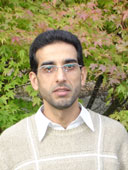New Arabic professor expands USU’s global horizons, perspectives
December 11th, 2010 Posted in Arts and LifeBy Satenik Sargsyan
LOGAN—Now that the fall semester is history and students are busy cramming for final exams, few remember what used was one of the most exciting topics at the beginning of the semester—Utah State University started offering Arabic as a part of its language curriculum.
 The choice of the professor was essential for the class, born out of student petitions. Students certainly expected a quality class. However, what they didn’t anticipate was someone with a bachelor’s degree, three master’s degrees and two PhD’s.
The choice of the professor was essential for the class, born out of student petitions. Students certainly expected a quality class. However, what they didn’t anticipate was someone with a bachelor’s degree, three master’s degrees and two PhD’s.
Syria native Abdulkafi Albirini has the entire package. His six degrees, academic distinctions and easy-going personality won him the position. His attachment to teaching and dedication to people make his teaching experience significant and fulfilling, Albirini said.
“When I came to Utah for my interview, I was told that students petitioned for this class,” Albirini said. “And being this person who can fulfill the student need is very important. This is why I enjoy teaching, because I feel like I am of benefit to people.”
Albirini’s education started in Syria with a bachelor’s degree in English literature; he graduated in 1991 as the top student in the country.
After teaching in Syria for two years, Albirini moved to the United States to continue his education at Ohio State University, where he pursued a master’s degree and a PhD in technologies of instruction and media. He also finished a master’s degree in Arabic and Islamic studies.
“My family lives in Ohio,” Albirini said. “I have two brothers who are physicians. They graduated from Cleveland Clinic. So I know that inarguably the education in the United States is the best in the world, especially the graduate education.”
A job opportunity took Albirini to University of Illinois, where he coordinated the Arabic program and also pursued a master’s degree and PhD in linguistics. Having taught in Syria, Albirini found teaching in the United States different and “much more enjoyable.”
“In Syria students take classes, and at the end of the semester they take a final exam. That’s it,” Albirini said. “But here there are more opportunities to interact with students, work with them, watch their progress and direct them. It’s easier to know what they are struggling with.”
“In Syria, it’s mostly lecturing.”
Albirini said that assigning multiple projects, quizzes and assignments throughout the semester gives him an opportunity to evaluate his job as an instructor and improve the course content as the semester progresses.
“When I give a quiz and see some problems in the results, I can tell that my teaching was bad at one point or that I didn’t convey the message I was trying to convey,” he said. “I take that and try to improve the instructions.”
Eric Olsen was one of the first students to enroll in Albirini’s Arabic class.
“It was definitely a smart investment for the university,” Olsen said. “Arabic is an important language in the world. It was really needed.”
Olsen said the class itself exceeded his expectations because of Albirini’s efforts. He described Albrini as “an excellent teacher,” adding that he “tailors the class to student needs.”
“I have taken a lot of language classes here,” said Olsen, who also is taking Latin, Greek and German. “Mr. Albirini is probably the best at using the communicative approach to teaching.”
Olsen said that Albirini’s class is among his favorites.
“He is really good at repeating and reviewing the material,” Olsen said. “The alphabet is really hard, but we learned it in a month when it would usually take two to three months to learn. We also started learning vocabulary on the first day.”
Olsen also said that the group projects in the class are particularly helpful because of having native speakers in the class.
“We do a lot of work in pairs,” Olsen said. “I recently worked with a Saudi girl, and it helped me a lot.”
While U.S. students like Olsen are eager to learn Arabic, native Arabic speakers are hoping the class will boost their GPA.
“Many of my [Arabic] friends are taking the class mostly because they think it’s an easy A,” said Ayman Alshawy, a native Arabic speaker. “But the grammar is difficult even for native speakers, so they may not end up with as good a grade as they hoped for.”
Moving from Ohio and Illinois to USU, Albirini said he misses the diversity of his previous campuses. However, he had heard from colleagues and friends that people in Utah are nice.
“One thing that I like about Logan is that people are really very, very nice,” he said. “That’s one thing that should attract anyone to Utah. People are very nice, very understanding and very receptive.”
Accustomed to moderate Mediterranean weather, Albirini said that Utah’s climate is also something he needs some getting used to.
Six academic degrees and 10 years of teaching experience behind him, Albirini says he is still awaiting his biggest accomplishment.
“I will achieve something big when I achieve something that’s not for myself,” he said. “All of my achievements so far are for myself. When I achieve something for the humanity or the academic circle, that would be something worthy.”
TP
Tags: Abdulkafi Albirini, Arabic, language class

Sorry, comments for this entry are closed at this time.